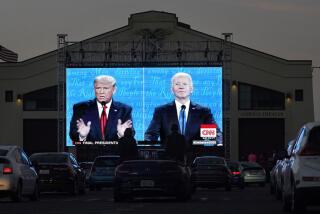Study: Obama beating Romney in the online campaign game
President Obama’s reelection campaign posted almost four times as much content online, and on nearly twice as many platforms, as challenger Mitt Romney’s campaign, a nonpartisan studyof the presidential race has found.
The Pew Research Center’s Project for Excellence in Journalism found the “digital gap” after reviewing online communications from the two camps for two weeks early in June. The group found the Obama online advantage greatest on the microblogging site Twitter, where the Romney campaign was sending out a single tweet a day compared with 29 a day delivered on behalf of Obama. (The study apparently did not measure Twitter traffic from the many individuals in both camps who tweet about the contest.)
The president’s online campaign also posted about twice as many videos on YouTube and put up about twice as many blog items. Amy Mitchell, deputy director of the Project for Excellent in Journalism, said the Romney campaign appeared to be taking steps to “close the technology gap” and would be expected to gain momentum with Rep. Paul D. Ryan added to the Republican ticket. “But there is a long way to go,” Mitchell said, “before the Romney team matches the level of activity of the Obama campaign.”
An edge in one corner of the media landscape can hardly hurt, though it’s hard to say it will be definitive. Howard Dean won the digital campaign in 2004 — with his supporters raising huge amounts of money online and organizing via Meetup.com — but he lost to Sen. John F. Kerry (D-Mass.) in the Democratic primaries.
The explosion of online and portable electronic devices over the last eight years would suggest that digital campaigning has become more important since then. But candidates only can succeed if they master strong message delivery in every medium — including television, radio and print.
Most of the online content from the two 2012 campaigns focuses on their own candidates, though more of the Romney posts (30%) targeted Obama, compared with Obama posts focused on the former Massachusetts governor (14%).
“While more digital activity does not necessarily translate into more votes,” said Tom Rosenstiel, director of the Pew journalism project , “historically candidates who are first to exploit changing technology have an advantage.”
Twitter: @latimesrainey
More to Read
Sign up for Essential California
The most important California stories and recommendations in your inbox every morning.
You may occasionally receive promotional content from the Los Angeles Times.









